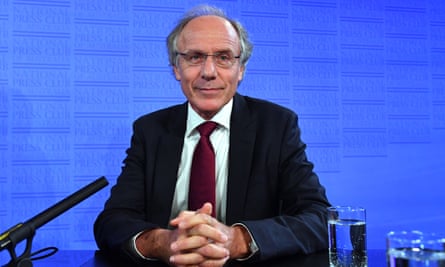Alan Finkel’s support for an expanded role for gas-fired power is not consistent with a safe climate, 25 scientists say.

Last modified on Wed 26 Aug 2020 04.18 AEST
Australia’s chief scientist, Dr Alan Finkel, has rejected a letter from leading scientists who warned his advocacy for increased use of gas-fired electricity was at odds with the Paris climate agreement.
The 25 scientists, several of them globally recognised in their fields, applauded Finkel’s support for renewable energy but said his backing an expanded role for gas as a transition fuel was not consistent with a safe climate.
The letter was prompted by a speech the chief scientist gave to the National Press Club in February, in which he said gas would play a “critical role” for many decades as renewable energy scaled up, and his subsequent support for the government’s claim more gas-fired power was essential.
The scientists said they were concerned about Finkel’s strategy for dealing with climate change and offered to provide him scientific advice on the issue.
“There is no role for an expansion of the gas industry,” they wrote. “The combustion of natural gas is now the fastest-growing source of carbon dioxide to the atmosphere, the most important greenhouse gas.”
The letter was organised by Prof Will Steffen, the inaugural director of the Australian National University climate change institute. Signatories include professors John Church, Lesley Hughes, Terry Hughes, Ove Hoegh-Guldberg, Mark Howden and Matthew England.
In a written reply on Tuesday, Finkel thanked the scientists for acknowledging he shared their vision for renewable electricity and said it was rewarding to see the role it was already playing in cutting greenhouse gas emissions.
But on gas he said he could only reiterate what he said at the press club. “Namely, that the adoption of more renewable electricity will be faster, more economical and more reliable if natural gas-fired electricity generation continues to be available in the near to medium term,” he said.
He said there would be times when renewable energy generators would not be able to meet demand, and that gas generators could fill the gap where batteries and pumped hydro power ran short.
He said gas power had lower emissions than coal and could be ramped up more quickly, so it did not need to run as often. Gas is often described as having half the emissions of coal, but recent studies have suggested it could be more.
The prime minister, Scott Morrison, strongly backed gas in parliament on Tuesday, declaring that expanding supply was critical to Australia’s economic recovery after the pandemic.
In response to a question from the Greens leader, Adam Bandt, critical of the Coalition’s support for a gas-led recovery, Morrison said gas was an important transition fuel that would “firm renewable technologies”. “That is why we want to see more of it and get more out of the ground … so we can fuel the jobs that this country needs to come out of the Covid-19 recession,” he said.
Morrison, who is working up an energy package ahead of the October budget, used Bandt’s question to round on Labor. The shadow resources minister, Joel Fitzgibbon, has endorsed taxpayer underwriting of gas infrastructure and been rebuked by the Labor leader, Anthony Albanese, and the shadow climate change minister, Mark Butler. Morrison said while Labor was “confused” about gas, the Coalition was “all behind it” and he declared the Australian public would be too.
Finkel said in his letter to the scientists he had not commented on an expanded role for gas in industry, having focused solely on the electricity grid.
The Australian Energy Market Operator (Aemo) last month found new-gas fired power was not essential for an electricity grid increasingly based on renewable energy, and gas prices would need to stay at lower levels than expected if it was to compete with pumped hydro, batteries and other alternatives.
The finding was included in Aemo’s integrated system plan – a roadmap for an optimal national electricity market over the next 20 years. Finkel had recommended the roadmap in a 2017 review of the electricity market for the then Turnbull government.
Guardian Australia asked Finkel in June why his assessment on gas differed with a draft version of Aemo’s plan, and whether there was modelling or empirical analysis to support his belief that the fossil fuel was critical to the national grid.
He said he was basing his assessment “on the real-world experience of Britain, California and South Australia”.
“They have successfully reduced their annual coal-fired electricity emissions by using high levels of gas to support solar and wind,” Finkel said. “Gas turbines already in the Australian national electricity market can help to support the transition to a low emissions electricity system.”
The Intergovernmental Panel on Climate Change found global emissions would need to reach “net zero” by about 2050 to give the world a chance of meeting the goals of the Paris agreement.
No comments:
Post a Comment